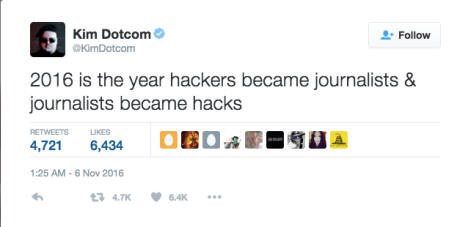
Donald Trump’s stunning defeat of Hillary Clinton will be sliced and diced in the news media for years. The political significance of what happened on Election Day 2016 can’t be understated.
By all accounts, this was a populist revolt against what many believe is a corrupt, business as usual government designed to benefit the wealthy and connected.
While you were watching a political revolution play out, you were also watching a concurrent revolution in the news media. The revolution in the news media may well have tipped the scales in the 2016 election.
People have been drifting from so called legacy media for years. Just ask print newspaper companies like the New York Times and Gannett.
The reasons range from technology to trust and beyond, but consider that the news media missed the political story of a lifetime when they failed to see the depth and breadth of the Trump phenomenon, or appreciate its significance.
The New York Times’ Jim Rutenberg’s navel gazing piece the morning after the election makes good points. But he scoffs at the idea of getting to know the people he never knew existed. The thing that made him, and other “elites,” miss the story in the first place.
In the end he can’t help but blame those ignorant barbarians who didn’t go with the press’ choice for president.
Smug much?
One CBS journalist thought so and put it in writing.
Enter stage right:
Organizations like Julian Assange’s Wikileaks, James O’Keefe’s Project Veritas, and Tom Fitton’s Judicial Watch are doing things people expect of journalists. Sort of. But, hang on sloopy and consider this.
Is it hard to believe that some disillusioned Bernie Sanders voters, angered by the Democratic National Committee’s collusion with the Clinton campaign to fix the primaries, just stayed home on Election Day?
That would be Wikileaks, which also exposed some of the nasty inner workings of the Clinton campaign. The daily drip of news that confirmed people’s mistrust of Hillary Clinton.
And before you say the Wikileaks saga was a big nothing-burger consider this Jeff Dunetz piece.
Some journalists have a problem with Assange’s method of obtaining his information. Hackers.
But today’s hackers are yesterday’s document thieves. See: The Pentagon Papers.
Troubling? Decide for yourself.
How about reporters going undercover?
Many in the journalism world are unhappy with James O’Keefe’s hidden camera stings. O’Keefe uses deception, such as phony ID’s and aliases. His tactics are frowned upon by many in the news media.
O’Keefe has had run-ins with the law, for trespassing. He’s been criticized for editing video to make his point. He reportedly settled out of court for $100,000 with an ACORN worker after he was accused of misrepresenting him in a video.
While some of his behavior is problematic, journalism is often messy and uncomfortable. It’s why every news operation I’ve ever worked for had lawyers on staff. Journalists make mistakes.
Could on camera admissions of voter fraud and organized political violence from Democratic party operatives have swayed some votes?
I hope so.
Is James O’Keefe an example of today’s gonzo journalist?
Read about the debate, and check out some of the horrible things brave undercover journalists have uncovered going back to the 19th century. Some cool stories.
Judicial Watch has spent years prying loose information for, ”we the people” from our government. Tom Fitton uses Freedom of Information laws and the courts.
Look at his work on Hillary’s State Department e-mails. By the way, note “Vice” as a player in the second paragraph. Fitton has long been a thorn in the Clinton’s side.
And there’s the hacktivist group Anonymous, who went after the KKK in Ferguson, Missouri.
What’s happening reminds me of the days of so called “underground newspapers’ like New York’s East Village Other or the early days of the Village Voice.
They were often counter-culture thorns in side of “polite” journalism and everyone else.
What’s more, technology has spawned “citizen journalism.”
Hacktivist Kim Dotcom Tweeted out this nugget in response to Wikileaks revelations about some reporters:


Then there’s this from social media activist Cristina Laila:

Technology has democratized information in ways we couldn’t imagine just a generation ago. It’s allowed everyone with access to the Internet and a computer to become their own journalists and editors. That’s both exhilarating and frightening at the same time.
Exhilarating because change keeps institutions alive and dynamic.
Frightening, because with all those voices, on all those platforms, who do you trust?
Not all of those voices are equal. We need to be more discerning about where get our facts.
Pro tip: Skip the sketchy web-sites that make insane sounding claims you’d like to believe.
This time the barbarians aren’t leveraged buy-out, junk bond traders who destroy companies and jobs like in the great book. They’re the people challenging the conventions of journalism.
Today’s media barbarians are carrying smart-phones and video cameras and tablets. They’re changing the paradigm at light speed.
It seems old media has two choices. Embrace some of those new voices that make you uncomfortable and challenge your beliefs, or face an uncertain fate.
One thing for certain is the barbarians aren’t going away.
© 2016 carlgottliebdotnet